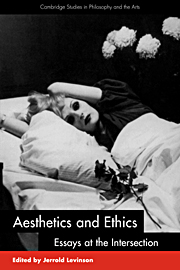Book contents
- Frontmatter
- Contents
- Editor's acknowledgments
- List of contributors
- 1 Introduction: aesthetics and ethics
- 2 Three versions of objectivity: aesthetic, moral, and scientific
- 3 Aesthetic value, moral value, and the ambitions of naturalism
- 4 On consistency in one's personal aesthetics
- 5 Art, narrative, and moral understanding
- 6 Realism of character and the value of fiction
- 7 The ethical criticism of art
- 8 How bad can good art be?
- 9 Beauty and evil: the case of Leni Riefenstahl's Triumph of the Will
- 10 The naked truth
- 11 Aesthetic derogation: hate speech, pornography, and aesthetic contexts
- Bibliography
- Index of names and titles
2 - Three versions of objectivity: aesthetic, moral, and scientific
Published online by Cambridge University Press: 22 March 2010
- Frontmatter
- Contents
- Editor's acknowledgments
- List of contributors
- 1 Introduction: aesthetics and ethics
- 2 Three versions of objectivity: aesthetic, moral, and scientific
- 3 Aesthetic value, moral value, and the ambitions of naturalism
- 4 On consistency in one's personal aesthetics
- 5 Art, narrative, and moral understanding
- 6 Realism of character and the value of fiction
- 7 The ethical criticism of art
- 8 How bad can good art be?
- 9 Beauty and evil: the case of Leni Riefenstahl's Triumph of the Will
- 10 The naked truth
- 11 Aesthetic derogation: hate speech, pornography, and aesthetic contexts
- Bibliography
- Index of names and titles
Summary
How does the objective validity of aesthetic judgments compare with the objective validity of moral judgments and scientific beliefs? There are two traditional answers. According to one, aesthetic and moral appraisals both utterly lack the cognitive authority of scientific inquiry, since neither kind of appraiser has access to a fact independent of her own judgments and neither is in a position to claim that all who are adequately qualified would share her judgment. For example, emotivists deprive both aesthetic and moral judgments of both kinds of objectivity. According to the other tradition, well-formed aesthetic and moral judgments have the same cognitive authority as wellformed scientific beliefs, because in all three realms the judgment maker is often in a position to assert a truth independent of her judgments, in a claim to which all adequately qualified inquirers would assent. For example, Kant puts the three realms on a par in both ways.
Each of these traditions has distinctive liabilities, which jointly suggest the need to explore a third alternative. The debunking tradition, depriving both aesthetic and moral judgments of all the authority of science, is hard to reconcile with the pervasive aspirations to truth and interests in impersonal argument of apparently rational people engaged in moral and aesthetic judgment. On the other hand, the claims to universality in the elevating tradition often seem wishful thinking.
Elsewhere, I have defended a view of morality and science that rejects the association in both traditions of rational access to appraiser-independent truth with epistemic universality.
- Type
- Chapter
- Information
- Aesthetics and EthicsEssays at the Intersection, pp. 26 - 58Publisher: Cambridge University PressPrint publication year: 1998
- 11
- Cited by



